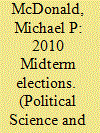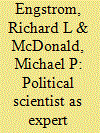| Srl | Item |
| 1 |
ID:
105422


|
|
|
|
|
| Publication |
2011.
|
| Summary/Abstract |
The 2010 midterm elections are consequential not only in terms of the candidates who were elected to office, but also in terms of the government policies that they will enact. High on the list of important policies is the decennial practice of drawing new redistricting plans for legislative offices. A new census reveals population shifts that will result in a reallocation of congressional seats among the states through apportionment and-following U.S. Supreme Court rulings in the 1960s-a re-balancing of congressional and state legislative district populations within states that aims to give fast-growing areas more representation and slow-growing areas less. Of course, much more than an innocuous administrative adjustment occurs during the process of redistricting. The individuals who draw districts are keenly aware that district lines may affect the fortunes of incumbents, political parties, and minority voters' candidates of choice.
|
|
|
|
|
|
|
|
|
|
|
|
|
|
|
|
| 2 |
ID:
105382


|
|
|
|
|
| Publication |
2011.
|
| Summary/Abstract |
Political scientists serve in courtrooms as expert witnesses on many topics related to their professional training: elections, same-sex marriages, employer sanctions for hiring undocumented aliens, school desegregation, political asylum requests, property rights, and racial profiling, among many others. It is not by chance that we-the authors-have chosen to testify as experts in cases concerning elections (see also Cain 1999). Election-related cases compose a large percentage of all cases involving political scientists brought to court: a study of references to expert testimony by political scientists in published federal district court decisions from 1950 through 1989 reports that 61% involved election law issues (Leigh 1991). Our replication of this study for the period of 2000 through December 18, 2010, reveals that 74% of such cases (28 of 38) involved election law issues. These cases involved issues of minority vote dilution, redistricting, alternative election systems (cumulative and limited voting), campaign financing, voting equipment and invalid ballots, voter registration, nominating petition requirements, and a number of other issues.
|
|
|
|
|
|
|
|
|
|
|
|
|
|
|
|